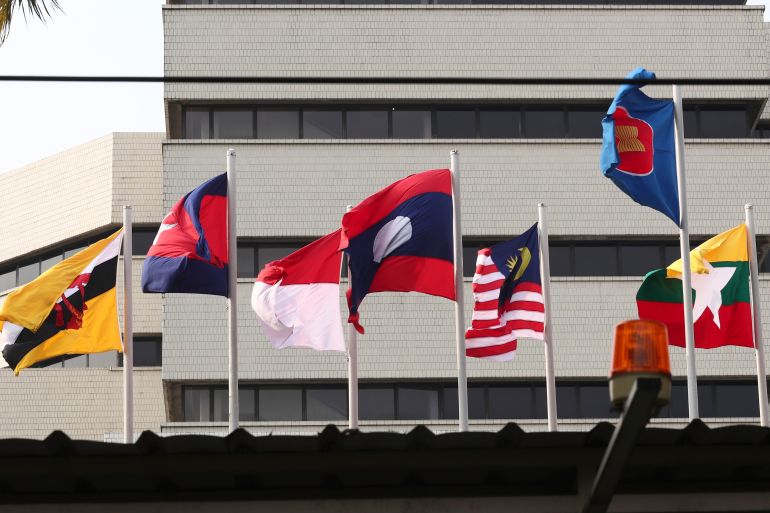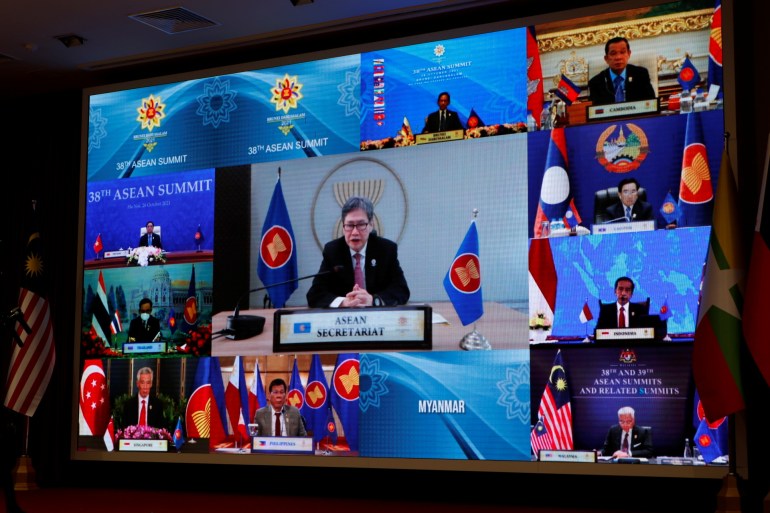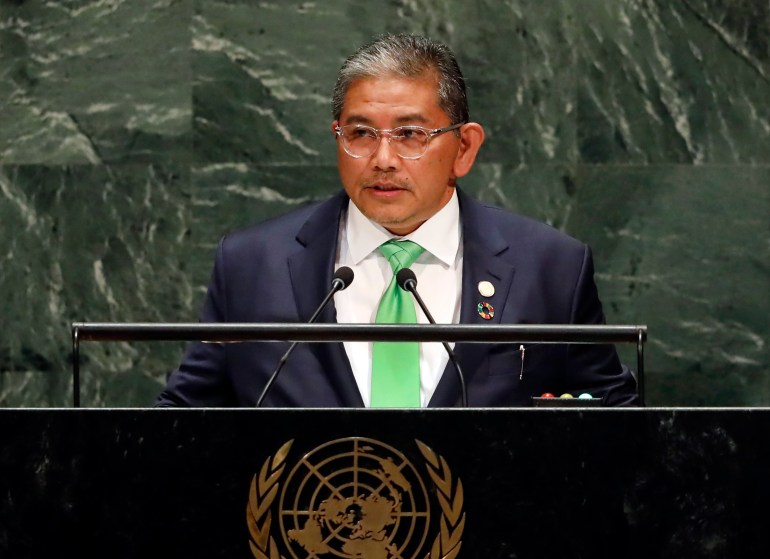Timeline: ASEAN tries to tackle Myanmar’s worsening crisis
As ASEAN summit kicks off without Myanmar’s top general, here are the key events in the bloc’s engagement with Naypyidaw since February coup.

Southeast Asian leaders have kicked off a summit without Myanmar’s top general, Min Aung Hlaing, who was barred from the meeting over “insufficient progress” in implementing a regional plan to end the country’s bloody political crisis.
Analysts say the Association of Southeast Asian Nations (ASEAN) exclusion of Min Aung Hlaing – who had toppled Myanmar’s civilian government in a February 1 coup – is the “most severe sanction” the bloc has handed down to a member state since it was established in 1967.
Keep reading
list of 4 itemsTop US official meets Myanmar’s shadow government
Myanmar activist Ko Jimmy arrested in military raid
UN fears ‘mass atrocity crimes’ in northern Myanmar
Made up of Brunei, Cambodia, Indonesia, Laos, Malaysia, Myanmar, the Philippines, Singapore, Thailand and Vietnam, the group is known for its non-interference in each other’s domestic affairs.
Myanmar had joined the bloc in 1997.

Here’s a timeline of key events in ASEAN’s engagement with Myanmar since this year’s coup:
ASEAN calls for restraint
On the day of the power grab, the United Nations and Western countries piled on their condemnation of the military, but ASEAN issued a more muted statement, calling for dialogue and a “return to normalcy in accordance with the will and interests of the people of Myanmar”.
Thailand, Cambodia and the Philippines also took a more hands-off approach, describing the developments as an “internal affair”, although Singapore, Indonesia and Malaysia did express concern over the military takeover.
As security forces began firing live rounds on protesters rallying against the coup, foreign ministers of ASEAN held talks with Myanmar’s military on March 2. They issued a statement urging “all parties” to “refrain from instigating further violence” in the country.
Indonesia, Malaysia, the Philippines and Singapore also issued statements calling for the release of Myanmar’s civilian leader, Aung San Suu Kyi. The 73-year-old had been detained on the morning of the coup and was later charged with a raft of criminal offences, including possessing unlicensed walkie talkies.
Five Point Consensus
The leaders of ASEAN hold an extraordinary meeting with Min Aung Hlaing on April 24 and agree on a five-point plan to tackle the crisis in Myanmar. The “Five Point Consensus” included ending the escalating violence, launching talks between all parties and appointing a special envoy to facilitate the dialogue.
China, Russia and US back ASEAN plan
As Myanmar security forces stepped up killings and opponents of the coup began taking up arms against the military, China, Russia and the United States back ASEAN’s diplomatic efforts to end the escalating crisis.
China’s Foreign Minister Wang Yi on June 7 met his Southeast Asian counterparts in the Chinese city of Chongqing and said Beijing supported “ASEAN playing a constructive role in properly handling Myanmar’s domestic issues”. However, Wang urged the bloc to avoid “undue interference” in the country’s affairs.
Russia, a key supplier of arms and training to Myanmar’s military, said on July 6 that it considered ASEAN’s plan as “the basis for resolving the crisis [in Myanmar] and bring the situation back to normalcy”. The US on July 14 also emphasised ASEAN’s centrality in tackling the chaos in Myanmar, with Secretary of State Antony Blinken urging the bloc to “immediate action” on the Five Point Consensus.
ASEAN appoints envoy
After months without progress, ASEAN picked Brunei’s Second Foreign Minister Erywan Yusof as its special envoy. Myanmar accepted the choice, though it was reported to have preferred a former Thai diplomat.
Indonesia said it had been an arduous process to convince Myanmar to commit to the envoy and the mediation process.

Myanmar blocks meeting with Aung San Suu Kyi
Erywan on October 6 accused Myanmar of inaction on the ASEAN plan and said the lack of progress was “tantamount to backtracking”. He also said he had asked for a meeting with Aung San Suu Kyi during an upcoming visit to the country, but said that the military had not responded directly to his request.
Days later, on October 13, a spokesman for the military said while Erywan was free to visit Myanmar, he would not be able to meet with Aung San Suu Kyi. The military justified the decision saying it was because of the criminal charges against the Nobel peace laureate.
Erywan then cancelled his trip.
ASEAN bars Min Aung Hlaing from summit
On October 16, Brunei, which is chairing ASEAN, issued a statement saying a non-political figure from Myanmar would be invited to its annual summit, delivering an unprecedented snub to Min Aung Hlaing.
“As there had been insufficient progress … as well as concerns over Myanmar’s commitment, in particular on establishing constructive dialogue among all concerned parties, some ASEAN Member States recommended that ASEAN give space to Myanmar to restore its internal affairs and return to normalcy,” the statement said.
Singapore said the move was a “difficult but necessary decision to uphold ASEAN’s credibility”.
Myanmar’s military blamed “foreign interference” from the US and the European Union for the rare rebuke and said it had informed Brunei that it can only accept participation by Min Aung Hlaing or a ministerial-level representative.